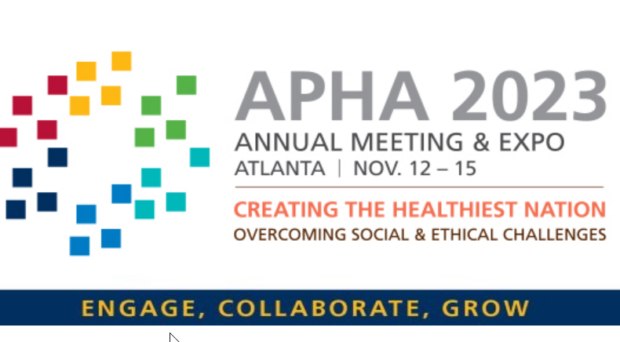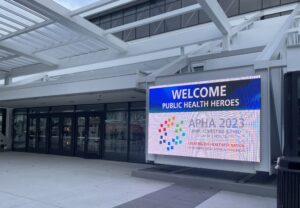
APHA 2023: Creating the Healthiest Nation
As the Editor of BMC Public Health, I had the opportunity to attend the American Public Health Association’s (APHA’s) 151st Annual Meeting and Exposition held in Atlanta, Georgia, one of the birthplaces of the civil rights movements.
The theme of the meeting, “Creating the Healthiest Nation: Overcoming Social and Ethical Challenges,” emphasized the importance of investigating the social and ethical challenges we are facing in our society to ensure a healthy and equitable environment, taking actions to apply what we learned from science.
Among all the amazing sessions, I would like to share with you some sessions which stood out as being particularly noteworthy.
This year’s meeting addressed different topics, including Artificial Intelligence in Public Health, Public Health issues affecting people with disabilities and Anti-Racism research.
Public Health and Artificial Intelligence: friends, enemies, or frenemies?
The APHA meeting was full of exciting sessions, and it was very difficult to decide which ones to attend.
Joshua M. Sharfstein, Vice Dean for Public Health Practice and Community Engagement at the Johns Hopkins Bloomberg School of Public Health, held a fascinating talk discussing the challenges and opportunities of artificial intelligence (AI) for public health practice.
AI techniques have been widely applied to infection-disease surveillance, making possible early outbreak detection and prediction of disease trends, allowing timely public-health response modeling and assessment. In this way, AI can identify previously invisible data, providing “new solutions to old problems.” However, AI models can be biased by the sources of data, increasing inequality in the society, for instance in terms of access to equitable care. Using AI brings with it the risks of eliminating the key role for human engagement, violation of personal privacy and lack of transparency, as AI systems make decisions in ways that humans are not always able to understand easily.
Within the field of Public Health, AI offers opportunities as well as risks. The key to success for good use of AI is a people-centered approach controlled by humans, which takes into account ethics issues, personal data protection and transparency of the models.
Inclusivity Scorecard: improving accessibility for people living with disabilities
People with disabilities, especially intellectual and developmental disabilities, face every day with many barriers, which are more than just physical obstacles. Disability is surrounded by stereotype, stigma and discrimination. People often assume that those with disabilities have a poor quality of life, are unable to care for themselves and are in general unhealthy. Supporting people with disabilities is a social responsibility and should be aimed to create an environment within our society where people with disabilities can have an independent life.

Within the session dedicated to emerging Public Health issues affecting people with disabilities, M. Alysia Mastrangelo, Professor of Physical Therapy at the Stockton University, described the development of the Inclusivity Scorecard. This tool is designed to be used by site managers of public spaces and owners of business and recreational areas. The Inclusivity Scorecard considers five priority areas, including accessible entrance, access to services, goods and supports, access to restrooms, approachability of the staff and website accessibility. The aim of the scorecard is to increase accessibility, providing equitable access and promoting social inclusion. The development of an Inclusivity Scorecard could help to evaluate a public space and provide important accessibility information in advance, providing support for individuals living with disabilities and their caregivers.
“Together we can move mountains”: Antiracism research, health equity and social justice
The second-to-last day of the meeting started with an interesting session held by leaders of anti-racist research. This kind of research tries to identify the reasons for racism and aims to unlearn internalized belief systems dictated by white supremacy, with the final scope to redistribute power and resources, uplift Black and Indigenous leadership in Public Health and more broadly address social injustices in society.
There is a need to develop anti-racist policies and practice interventions to address the issue of racism in communities and to educate, advocate and speak for health equity.
Wendy Barrington, Associate Professor in the departments of Health Systems and Population Health and Epidemiology within the University of Washington School of Public Health, talked about the Center for Anti-Racism and Community Health (ARCH). Dr Barrington was named Director of the ARCH in the fall of 2021. The ARCH Center provides a space within the university to nurture and develop Black and Indigenous scholars and anti-racist researchers, by serving as a resource for the implementation of anti-racist strategies at community level.
As Editor I have treasured this amazing experience where I learned more about new promising programs to improve the health of our society. I really hope that BMC Public Health can continue to disseminate inspiring Public Health insights and can’t wait to explore more at APHA 2024 in Minneapolis next year.
Comments